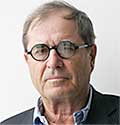Paul Theroux (Malawi 1963-65) & Peter Hessler (China 1996-98) In Current New Yorker
 The October 7, 2013 issue of The New Yorker carries a Letter From Egypt column entitled, “Keeping The Faith” written by Peter Heller (China 1996-98) that focuses on Sheikh Mohammed Fakeeh, a blind preacher from a poor farming family on the banks of the Nile who for the first time gave a sermon at Aziz Bellah, and influential mosque in eastern Cairo.
The October 7, 2013 issue of The New Yorker carries a Letter From Egypt column entitled, “Keeping The Faith” written by Peter Heller (China 1996-98) that focuses on Sheikh Mohammed Fakeeh, a blind preacher from a poor farming family on the banks of the Nile who for the first time gave a sermon at Aziz Bellah, and influential mosque in eastern Cairo.
In recent days, a few Cairo imams had been suspended, and all of them had been warned not to preach directly about politics. Certain words and phrases were regarded as off limits: “coup,” “legitimacy,” “injustice,” “military rule.” But avoiding the subject entirely was also a risk. If a sermon seemed too bland or apolitical, members of the congregation might shout down the preacher.
•

photo: Rachel Torres/Alamy
Also in the same issue is a new short story by Paul Theroux (Malawi 1963-65) entitled, “I’m The Meat, You’re The Knife” which is set in his hometown, not Africa.
I was walking down High Street to the funeral home when I spotted Ed Hankey coming toward me. He said, “Jay,” then, “Guess who’s sick?,” then blinked and concluded, “Murray Cutler.”
Sometimes bad news takes the form of a greeting. I hadn’t seen Hankey for more than twenty years, and I assumed that this abrupt announcement was a tactic to overcome his awkwardness. So I didn’t want to reply by explaining that I was back in Medford Square after so long because my father had just died. Family tangles, bereavement, and failure send us home, seldom happiness. I was headed to Gaffey’s to meet my mother and my sister, to choose a coffin and arrange the viewing. Perhaps Hankey already knew about my father and was avoiding the subject by mentioning Murray Cutler.
When I asked, “How sick?,” Hankey said, “He’s at a hospice.” His lisp made the word juicier and more emphatic. He cocked his head to look at me, clamping his mouth shut and widening his eyes.
I took a deep breath and nodded, reflecting on the news. Murray Cutler had been our high-school English teacher. He was one of those people whose death, I knew, would be a problem for me. I was resigned to my father’s passing: we had no unfinished . . .
Theroux does write about Malawi in the October issue of Departures, the magazine of American Express card holder. The entire issue is devoted to sub-Saharan Africa.
Paul writes,
Having arrived in this serene country from the violent upheavals of early 1960s America, I thought, This is the place for me. I felt lucky. I was about to be possessed, to experience the immense power of Africa. I was 22 years old, a Peace Corps teacher, and this was my first love affair with a landscape, and with people in that landscape. Letters — our only contact with home — took a month to reach us. In the post office we brushed fish glue onto postage stamps to stick them to the envelopes. At least I had the life-changing experience of something new to write about. Even years later, still in Africa, I felt the same way — blessed, inspired, liberated.
I am reading some of Paul Theroux’s books about his travels, mostly by train, through several continents and find them the most engaging non-fiction I’ve ever read.
Congratulations, John! It appears you and Marian have been successful with your long term strategy to have RPCV writers take over major publications!
I stopped subscribing couple years back. This may get me back.